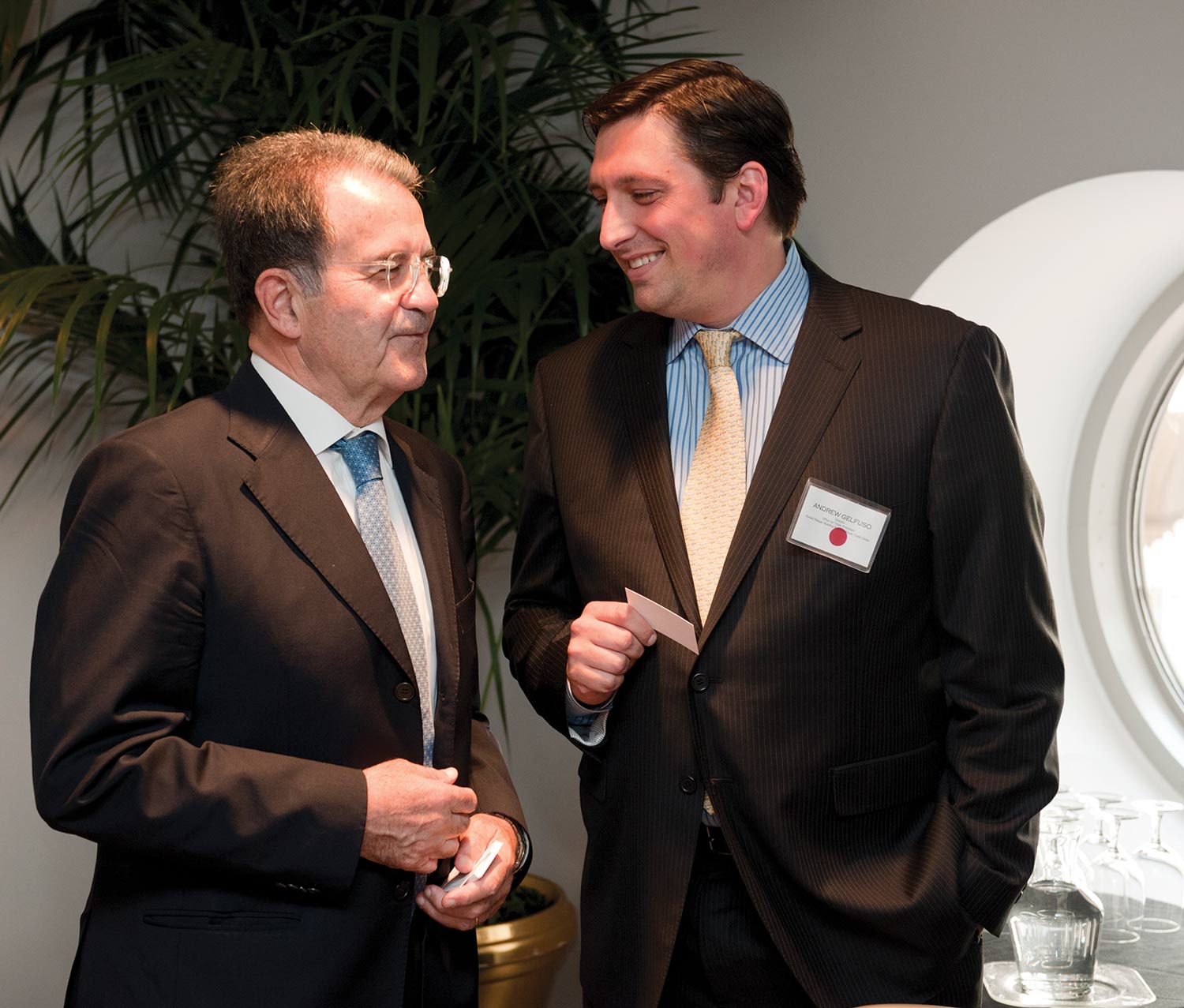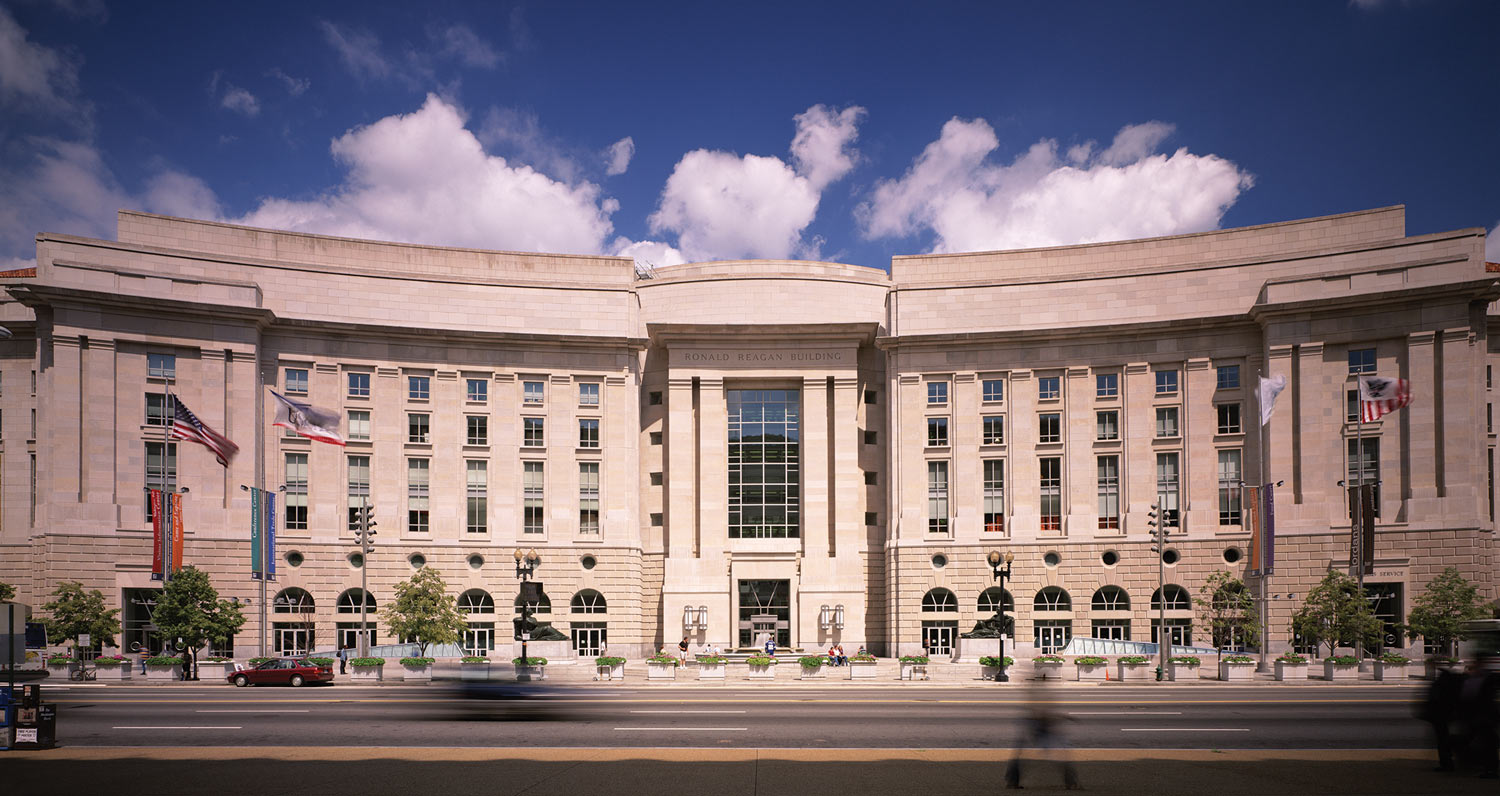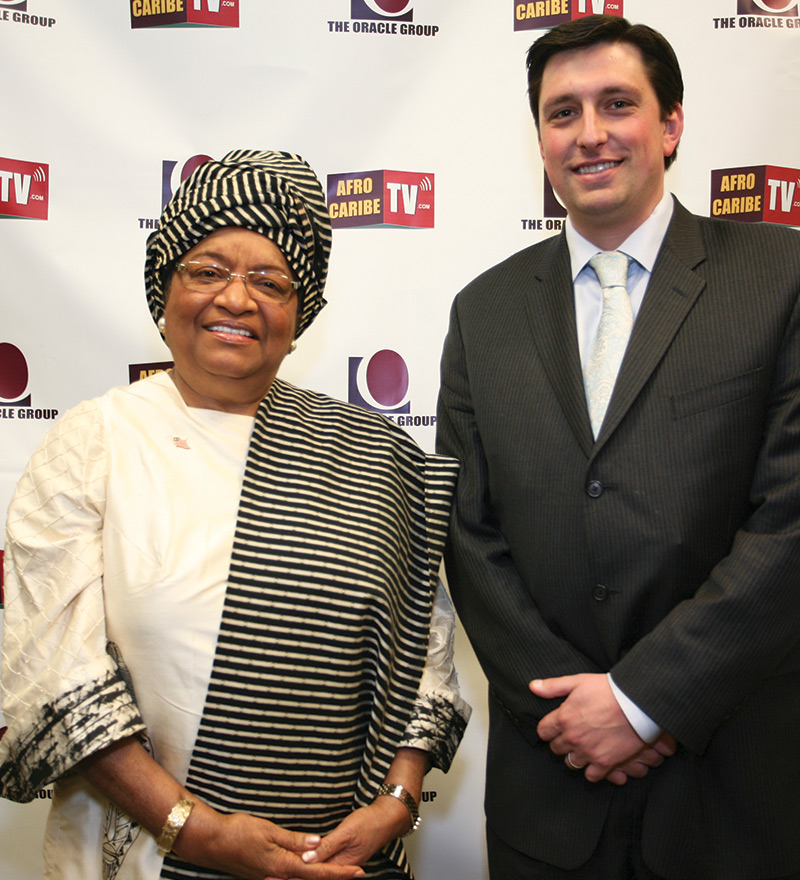G20 Executive Talk Series
Lead Feature / International Trade
Authored by: Ana C. Rold
The Future of Globalization and International Trade
Interview with Andrew F. Gelfuso, Vice President, Trade Center Management Associates (TCMA) Ronald Reagan Building & International Trade Center Executive Director, World Trade Center, Washington DC

Andrew F. Gelfuso and Former Italian Prime Minister Romano Prodi at the Ronald Reagan Building in Washington, DC.
Donald J. Trump’s rise to the Presidency of the United States has required businesses to rethink globalization, especially as it pertains to international trade. In the past three months, scholars and experts have asserted that the election of Donald J. Trump has signaled a retreat for globalization. However, based on globalization trends and the fact that the global economy is more integrated today than during the peak of the early 20th century, what we will see is the pace of globalization actually continue to increase, with new opportunities and challenges arising for leaders.
While globalization has brought immense benefits to many sectors, certain countries and individuals remain vulnerable. How can societies best approach the challenges this presents?
We had the distinct opportunity to meet with a man at the center of global trade in Washington, Andrew F. Gelfuso, Vice President of Trade Center Management Associates (TCMA) and the Ronald Reagan Building and International Trade Center. Mr. Gelfuso is also the Executive Director of the World Trade Center in Washington, DC.
As Vice-President, Mr. Gelfuso leads the global mission of the Center while focusing on international business development, program promotion, business matchmaking, outreach, trade counseling, strategic partnerships, government and diplomatic relations. Under Mr. Gelfuso’s leadership, the Office for Trade Promotion is responsible for driving the Congressional mandate of the Ronald Reagan Building and International Trade Center and for positioning the Center to be Washington’s focal point for a wide array of international trade, cultural and educational programming. Mr. Gelfuso also steers efforts in marketing, media relations, corporate publications and resource development.
Previously, Mr. Gelfuso was the Regional Manager for Asia at the U.S. Government’s Advocacy Center with the U.S. Department of Commerce. In this role, Mr. Gelfuso worked with U.S. companies on major projects and public sector procurements in Asia to ensure transparency and fairness on tenders and to counter foreign government intervention. His countries of responsibility included: Japan, South Korea, Taiwan, Singapore, Thailand, Vietnam, Philippines, Laos, Cambodia, Australia, Malaysia and Indonesia. The Advocacy Center is the lead agency in the U.S. Government for private sector advocacy under the terms of the Trade Promotion Coordinating Committee (TPCC) and Mr. Gelfuso worked in close collaboration with the Commerce Secretary’s office, USTR, the State Department, the White House, and U.S. Embassy officials and other TPCC agencies during his tenure and contributed to $35 billion dollars in successful transactions. During this time, Mr. Gelfuso passed the Commercial Foreign Service Exam and was offered a diplomatic assignment in Asia.
We asked Mr. Gelfuso about his thoughts on the future of international trade and globalization as a new administration takes charge in Washington.
The state of current and future of international trade and globalization has come under scrutiny recently. I would like to ask your comment on the following statements that many skeptics of globalization have made recently. Are they true or false and why?
ACR: Manufacturing jobs are the basis of American prosperity and outsourcing manufacturing means the demise of American economy. True or false?
AFG: False. By some estimates, the manufacturing industry and their related value chain colleagues in R&D, design, assembly, distribution, sales and service comprise up to one-third of the U.S. GDP. Further, less than 20% of all U.S. GDP is foreign trade and about half of that comes from the energy sector. The U.S. is moving more towards energy independence and consequently the reliance upon foreign trade is further reduced. While impact of the U.S. manufacturing industry is a significant component of a healthy domestic economy, up to twenty million U.S. jobs have been lost since 2000 due to outsourcing/off-shoring. The basis of American prosperity has been and will continue to be entrepreneurship, innovation and ingenuity across sectors including manufacturing, services, ICT, healthcare among others.
ACR: Imports make us poorer. True or false?
AFG: False. In general terms, imported goods and services offer the U.S. consumer a greater variety of items for consumption at a wider variety of price points. As real wages for the majority of Americans have increased very little in the past 20 years, lower priced foreign goods and services have helped keep the average American’s purchasing power high. This has added to both their quality of life as well as the overall growth of the U.S. domestic economy. Supporting domestically produced goods and services is important in terms of developing an increased tax base, especially given the federal government’s debt approaching $20 trillion. Further, increased domestic production of goods and services goes a long way towards creating and supporting new and higher value American jobs. However, let’s not forget that many of the items that may be considered to be “imports” are actually products and services that originated in the U.S. then were shipped overseas as part of an optimized supply chain for assembly into final products by lower-wage foreign workers in jobs that would otherwise be unattractive to the average U.S. worker.
ACR: Success of foreign firms always helps foreign countries; Success of U.S. firms always helps the U.S. economy. True or false?
AFG: False. The success of both foreign and domestic firms has the ability to contribute to both foreign and domestic economies. Foreign trade does not have to be a zero-net sum proposition. If properly structured it can be – and should be – a positive net sum proposition for both sides.
Having successful U.S. firms with high paying domestic jobs dispersed throughout the global value chain is an important part of the American economy, the same can be said of foreign firms with production in the U.S. As the largest consumer market, we possess the largest base of well-educated and well trained workers worldwide. Foreign firms tend to pay high wages and naturally contribute to the U.S. tax base. Foreign investors provide a large influx of capital through direct investment in financial markets, real estate and development, tourism, education, health care, and other sectors.
ACR: For a sizeable portion of the U.S. electorate—as well as publics in other countries—globalization and international trade sound like a conspiracy theory. What drives, in your opinion, this dissatisfaction and fear towards globalization?
AFG: Globalization isn’t explained well in sound bites. There are many views and explanations by smart reasonable people and organizations that contradict each other on what globalization even means, let alone if it can be labeled as either “good or bad.” Let’s review a bit of history to better understand how we arrived to where we are today.

Night view of the Ronald Reagan Building and International Trade Center and the Washington Monument in Washington, DC.
The global economic system has taken the place of the pre-Cold War system that has lasted numerous decades and has at its core free market capitalism, which has created a desire for the same set of opportunities, goods and luxuries for people around the world. That set of aspirations is fairly new, as India, China, and other countries have developed products and services consuming middle class in a relatively short amount of time. This provides both opportunities and challenges to U.S. businesses and its workers.
![]() The success of both foreign and domestic firms has the ability to contribute to both foreign and domestic economies.
The success of both foreign and domestic firms has the ability to contribute to both foreign and domestic economies.![]()
On one hand, there are more consumers globally to whom to sell; and on the other hand, there is more competition from companies abroad who do not have to jump through as many tax and regulatory hurdles as do U.S. companies due to the rapid pace of global development.
Today, thanks to technology, any business can market its goods and services globally on day-one by simply putting up a website that reaches the world. Globalization is changing faster than our ability as a society to understand and process winners/losers and to determine how best to regulate and thrive in this rapidly evolving system. The role of globalization and trade is to develop strategic partnerships between nations that advance mutual prosperity but their role in creating strong security alliances are rarely mentioned while the importance is profound. There has been a tremendous benefit to shareholders of many companies, but in the U.S. when factories have closed due to businesses seeking lower wages, fewer regulations, and overall lower production costs, many American workers have been left out of the growing global economy.
There is clearly a sense that corporations have too much power, we hear disagreement on both sides of issues such as taxation, regulatory, environmental and labor standards. We have seen a host of large successful U.S. companies relocate their corporate headquarters and/or factories to other countries to lessen their tax burden in what is sometimes called corporate inversion, to avoid our 35% corporate tax rate – the highest in the industrialized world. These are not simple issues to fix and too heavy a hand by government would stifle free markets.
In Tom Freidman’s book, “The Lexus and the Olive Tree” he explains globalization in simple straight-forward terms that countries who trade together tend to not go to war with each other. We are currently seeing a global nationalist movement that represents a temporary recoiling from globalization.
To regain forward momentum, government leaders must develop policies that create a fairer and more balanced trade environment, which will in turn advance their domestic economies while preserving the benefits of a healthy global capitalistic system.
ACR: It has been often noted that globalization/international trade has been good for the collective, but not good for the individual. True or false?
AFG: False. There are millions of jobs that have been created by the global economic system and currently available in the U.S. that continue to go unfilled because many workers do not have the proper training to fill them. Individuals have a more diverse set of careers and areas of study available to them then perhaps ever before in human history. As mentioned previously, the variety of imported goods and services available to us here in the U.S. provide Americans with cost savings, an increased variety of products and services at every price-point, as well as increased competition that benefits the U.S. consumer.
Just in the past couple of decades we have experienced the dot.com bubble, the real estate bubble, and many say we are currently in a tech bubble. We have seen real estate values rise at unprecedented levels, the subprime mortgage crisis and the great recession. Today we have the financial markets performing incredibly well. The Dow Jones Industrial Average, made up of 30 North American Blue Chip stocks, has never been valued higher. Our workers (and workers worldwide) still need to be educated, learn to be more entrepreneurial, flexible and adaptable to be able to thrive in the post-Cold War global capitalistic economy. Even as we appear to be heading into a more nationalist trend globally, globalization has been here since the beginning of time and was given a significant adrenaline boost by rapid advances in automation, ICT, cyber in the past two decades.

Daytime view of the Ronald Reagan Building and International Trade Center in Washington, DC.
ACR: Tell us about your work in international trade in your capacity as the leader of Washington’s preeminent global trade organization. Why is Washington a worthy hub for international trade?
AFG: Our role at the Ronald Reagan Building and International Trade Center is to provide an open forum for businesses, NGOs, the U.S. Trade Agencies, think tanks and foreign governments to come together to share ideas around cross border trade and international cultural exchange. Rather than take a position on policy, we work to foster a world class forum in the nation’s official World Trade Center and shine a spotlight on experts in their fields to educate, advocate and debate their positions. We host approximately 280 international and cultural trade events per year, as well as host exhibits, concerts, national days, student programs, and incoming trade delegations seeking to meet local partners and understand U.S. policy in the context of foreign and domestic trade. We have a beautiful building, a large outdoor plaza and 27 conference rooms coordinated by an exceptional staff who are able to customize events of all kinds while the reputation of our hospitality, food, and client service are highly regarded around the world.
It is a fascinating place to be, especially now, because of rapid and ever-changing nature of the geopolitical and the U.S. political environment. Today we have a new administration that ran on a platform of “America first” that appeals to both workers who want better jobs, as well as investors and shareholders who are seeking greater returns on their investments through better enforcement and transparency in fairer trade agreements.
Many companies that operate interdependently within a complex global supply chain are wondering what will replace TPP? How NAFTA might be reformed and what that would mean for them? What might new immigration measures mean for hiring across the country? To address many of these concerns, here at the Ronald Reagan Building and International Trade Center, we bring in domestic and foreign trade officials to speak with businesses, engage with embassies, and speak with leaders from the U.S. business community regarding how to engage in more constructive dialogue and collaboration.
Washington has always been a place where foreign officials and businesses have flocked to connect and develop key contacts in both the policy and political realm. More and more, we have seen citizens, including and especially millennials who have migrated to the Greater Washington, D.C. area as it increasingly becomes a hub for global trade. We have two pro-business governors in Virginia and in Maryland, as well as a Mayor in Washington D.C. who have been increasingly active in recruiting new businesses to the area, as well as and providing greater assistance to local business seeking to spread their wings internationally.

Andrew F. Gelfuso with Ellen Johnson Sirleaf, President of Liberia, at the Ronald Reagan Building in Washington, DC.
There are a number of world-class private and public sector resources available to businesses in the Greater Washington, D.C. area that are help propel the region’s growth. Three first class airports, several seaports with hours away, think tanks and NGO’s, an enormous service industry with growing exports, a bio-med industry co-exist and support each other along with the defense industry, has created a broad economic base for the Greater Washington D.C. area which underpins the unique character of America’s most global city. This region has a well-educated and trained workforce that has created a true sense of community for the area with its great schools, culture, hospitals and medical facilities, broad base of tourism and hospitality, along with many museums and professional sports teams. The area is also home to more embassies than any city in the world.
ACR: What are your thoughts on the future of international trade?
AFG: The global economy will continue to grow amidst a temporary pushback against globalization, as the world’s markets and their prosperity are too intertwined to unwind. The march of globalization has been going on steadily for millennia, and has oftentimes ebbed and flowed throughout history. This current pushback is just one more that the world has experienced since the beginning of humankind.
In the short term, I do expect to see a focus on enforcement of current trade agreements and an effort to make these agreements fairer and more balanced for all sides, as well as a close review and perhaps a modernization of the system of governance within the World Trade Organization (WTO). I also expect that there will be a closer look at how to reform U.S. tax code and how to develop further incentives to encourage both U.S. firms to stay here in the U.S., and to also encourage more foreign firms to set up their operations here.
At the same time, I do not expect the U.S. to turn inward, and in fact, I expect that we will continue encouraging subsidiaries of foreign firms to relocate their operations to the U.S. and hire American workers. These firms increasingly recognize that they need to be closer to their customers and to be seen by the U.S. consumer as good corporate citizens involved in the community and creating American jobs.
Overall, the U.S. has had over the past 70 years and will continue to maintain a comparative advantage in many industry sectors. The U.S. has been the perennial center of global entrepreneurship, flexibility and specialized technology, this will continue be so, as the U.S. rewrites the rules for the world’s global economic system.

Ana C. Rold is the Founder and CEO of Diplomatic Courier, a Global Affairs Media Network based in Washington, DC and with an audience spanning 180 countries. Ms. Rold has served as Editor-in-Chief of the G7 and G20 Summit magazines since 2009. She teaches Comparative Politics at Northeastern University.